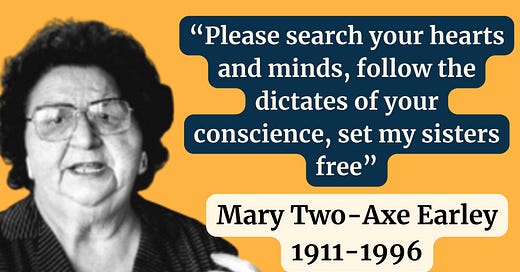Mary Two-Axe Earley (1911-1996)
An inspiring advocate and determined human rights activist, Mary Two-Axe Earley is an integral part of Canada’s history. Her work changed the tide of the Canadian women’s movement, challenging discriminatory and patriarchal Canadian laws.
Born in 1911, Mary grew up on the Kahnawà:ke reserve in Montréal. At 10 years old, her teacher and healer mother, who had raised her, suddenly passed away – and by 18, Mary migrated to the United States to find work because of the limited opportunities on reserves in Canada. However, it was in Canada that Mary would spend most of her time fighting the government for change.
Mary’s key cause was the injustices faced by Status Indian women – particularly discrimination in the Indian Act, in which an 1876 amendment decreed that Status Indian women specifically had no rights and would lose their status if they married a non-Status Indian man. As a result, Indigenous women were consistently disenfranchised, stripped of individual identities and land rights, and marginalized compared to Indigenous men. In 1966, a close friend died from a heart attack that Mary felt was directly tied to the horrible stress her friend had experienced from being denied her rights under the Indian Act. As a result, she felt personally driven to ensure women’s human rights were respected and protected by law.
Once in action, Mary used her voice to call attention to the abuses and injustice of these practices. She was involved in campaigns as a speaker, working with women’s groups lobbying for constitutional reform. This led to the 1967 hearings of the Royal Commission on the Status of Women in Canada, at which Mary led a deputation with the organization Indian Rights for Indian Women, to publicly share the experiences of Indigenous women. Despite the RCSW findings ruling in favour of giving Status Indian women the autonomy to retain and transmit their status – no such changes were adopted by the government.
But Mary did not give up – throughout the 1970s she fought harder than ever against the oppression. A turning point came in 1975; while attending the International Women’s Year conference in Mexico with 60 other Kahnawà:ke women, Mary was informed they had been served eviction notices, which she immediately used to demonstrate, on an international platform, women’s experiences of sexist and racist discrimination. International publicity and negative press ensured the band council withdrew the order. This event set in motion the wheels for Mary’s continued fight, alongside the unfaltering work of Indigenous women activists Jeanette Lavell, Yvonne Bedard, and Sandra Lovelace. Their collective advocacy led to a significant change in 1985, when Bill C-31 was passed. This amended the Indian Act to ensure women had a status reinstatement process – and Mary herself received her status once more on 5th July 1985.
While a hugely significant step, the work was far from finished; Mary continued to be a vocal advocate for women’s rights for the rest of her life, including testifying at the Federal Court of Canada in her wheelchair at 83 years old – convincing the Court of its responsibility to ensure Indigenous women’s inclusion in band membership. Her drive and her achievements have continued to inspire the women’s movement – and her equality work was recognised with a Governor General’s Person Case Award in 1979.
We hope you enjoyed this short profile on Mary Two-Axe Earley! For more information on her and other trailblazers, check out The Canadian Encyclopedia online, Historica Heritage Minutes and the Women of Impact Gallery.
Do you have a Canadian heroine you’d like to see featured in Voices & Stories? Have any suggestions for us? Don’t hesitate to leave a comment or a direct message on our Substack (or at any of our socials!). You can also get in touch by email at communications@womenshistoryproject.ca





